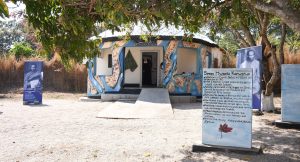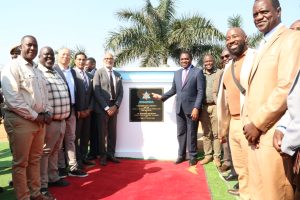By John Muhanga and Gladwell Ngoma
The Ntongo traditional ceremony is a vibrant and culturally significant event for the Kaonde people of Chief Chizela of Mufumbwe District in Zambia’s North-western Province.
This annual ritual, steeped in history and tradition, serves as a moment of gratitude to God for the bountiful harvests of the past farming season.
As an enduring symbol of the community’s connection to their land and heritage, the Ntongo, originally known as “Mutwe Wa Nzovu” traces its origins to the 1600s when the Kaonde people first established their chiefdom in Mufumbwe.
Mutwe wa Nzovu, which means “head of the elephant,” which reflected the grandeur and significance of the ceremony in its early days, used to take place each time hunters successfully killed a vicious animal like an elephant, lion or leopard.
“It was at this ceremony that Mutomboko dances were performed as well as the eating of Makonda – the heart, throat and lungs of the elephant, indicating the bravery of the Kaonde people.
“Over the centuries the name evolved to Ntongo, but the essence of the celebration remained the same: a communal expression of gratitude for the harvest and reaffirmation of cultural identity,” says Chief Kizela’s representative Lapson Kayombo.
The modern Ntongo ceremony is a blend of the ancient rituals and contemporary cultural expressions, making it a unique spectacle that attracts both locals and international visitors from other parts of Zambia and across the region.
The 2024 Ntongo ceremony was a kaleidoscope of colors, sounds and movements, showcasing the traditional dances, music and rituals of the Kaonde people.
Just like in times past, traditional dances like Mutomboko, Kaonde, and Katembo were central to this year’s ceremony, breathing life into the event with each dance carrying its unique significance and storytelling aspect reflecting the values, history, and social fabric of the Kaonde people.
“The Kaonde dance is a performance that symbolizes unity and collective effort as dancers dressed in colorful traditional attire, move in intricate patterns to the rhythmic beats of drums. The Katembo dance, a vibrant and energetic performance performed by local Indunas and headmen, is a dance that is steeped into tradition and symbolism, representing leadership, wisdom and transmission of cultural knowledge,” explains Mr Kayombo.
“The indunas and headmen, adorned in regal traditional garb, perform synchronized movements that depict stories of bravery, governance and triumph,” he added.
Historically, traditional ceremonies have been powerful platforms for promoting oneness among Zambian people: an initiative which is believed to have played a pivotal role in sustaining the country’s long standing peace and unity.
North-western Province Minister Robert Lihefu was the guest of honor at this year’s event and as such, the ceremony was a platform for promoting peace and unity in diversity.
“Traditional ceremonies must not only be held to promote different cultural values but should also be a symbol of peace and unity in diversity; for if we remain united and peaceful, it is easier for us to develop as a nation,” said Mr Lihefu in a speech read on his behalf by acting Provincial Deputy Permanent Secretary Tradeson Mulofwa during the ceremony.
Chief Mukumbi Kizela IX (commonly referred to as Chief Chizela), through his representative Lapson Kayombo applauded the government for ending the protracted disputes and subsequent legal battles regarding the ownership of the Kalengwa Mine that had dragged on for more than ten years.
“We are so delighted as a chiefdom to this hardworking government through his excellency President Hakainde Hichilema for his wise leadership of putting to rest the issues that had been holding the reopening of the Kalengwa Mine; there is now hope that Mufumbwe will develop at a faster rate,” he said.
For decades, the Ntongo Traditional Ceremony has amazingly continued to receive support from various stakeholders and sponsors with Moxico Resources Zambia, the company which is interested in the operationalization of the Kalengwa Mine in Mufumbwe through a partnership with Euro-Africa Kalengwa Mine, being among the consistent funders of the Ntongo ceremony in recent times.
Moxico Resources Zambia Country Director Davies Mwanamoya disclosed at the event that the involvement of the mining firm does not only highlight the importance of Corporate Social Responsibility (CSR) but also shows how much value his organistion places on the need to preserve the country’s culture and values.
“Moxico Resources Zambia continued sponsorship of the ceremony goes beyond the commitment towards the importance of Corporate Social Responsibility (CSR), but also demonstrates the company’s desire to contribute towards the preservation of the Kaonde cultural heritage as well as strengthen its relationship with the people of Mufumbwe,” said Mr Mwanamoya.
It is a fact that traditional ceremonies like the Ntongo of the Kaonde people under Chief Chizela (Kizela) of Mufumbwe District in North-western Province do not only define its people but also offer an opportunity for the people of Zambia to espouse the core values of their culture and heritage. And so, it is crucial to support and preserve cultural ceremonies because they serve as a bridge between the past and the present, ensuring the rich heritage of the people, celebrated and passed down through generations , to unite, inspire, and sustain communities.





